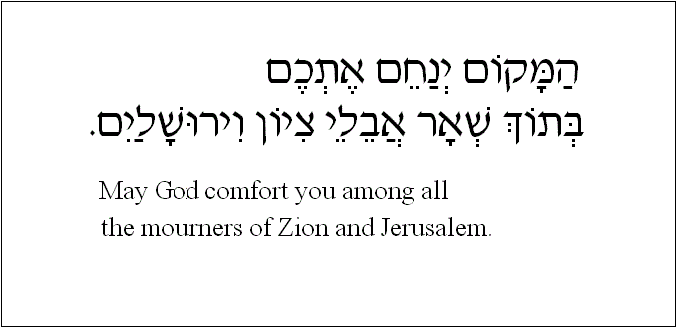Like many Jewish communities around the world, in death, my community mobilizes to help someone in mourning. Several people volunteer for this and handle it year-round. Plus, the community quickly jumps in to provide food for the mourning family. I’ve written about much of this already so now I’d like to write about the pluralism of mourning in Judaism. It’s something quite amazing.
Interestingly enough, there are at least two aspects of pluralism in Jewish mourning that I encountered. The first was the obvious “universality” of mourning for a parent.
So many came and shared their experiences with me. Of parents who had died young, of the end that comes after long suffering. Each was a successful attempt to welcome me into yet another one of those clubs in life that you wish you never joined.
Along with the low chairs that mourners sit on, the community committee gave us a piece of paper covered in plastic. It was to be hung behind the mourner so as each person took their leave, they could whisper those words quietly in comfort. While Sephardic Jews have a similar sentence, it is the Ashkenazi one that I’d like to discuss and the pluralism of the phrasing.
I can’t count how many people came and how many whispered these words of comfort.
HaMakom yenachem et’chem b’toch shar avay’lay Tzion veh Yerushalayim
May “the Place” (a euphemism for God) comfort you among the mourners of Zion and Jerusalem. But the sentence can be grammatically incorrect when you address a single (female) mourner. The word “et’chem”. It means “to you” but hints at a major difference between Hebrew and English. Hebrew, like many languages, has feminine and masculine conjunctions and for each, both singular and plural forms. Et’chem is plural.
Many who came, corrected the form to be singular and feminine, as would be appropriate when addressing a single female mourner. Mid-way through the shiva period, dear friends came. Many times over the years they lived in my neighborhood I attended lessons and Divrei Torah (literally “words of Torah) that always touched my heart. This time, he addressed a question that I had in my mind. Over the days of sitting, some people “corrected” the Hebrew and some did not. Should I have corrected it for them? There was no pattern. Men and women. Israelis and non-Israelis. Veteran immigrants and new immigrants either corrected it or didn’t. Should you correct it? The answer, it turns out, is no.
In the end, two rabbis offered two versions that led to the same conclusion. One rabbi came and corrected it; some native-Israelis corrected it but others didn’t. Ultimately, the answer was both simple and beautiful and leads right back to the pluralism in Judaism. We are a single people, a single nation – joined by a common past, present and future and in that unity, comes the answer. May God comfort “you”. How can the “you” be plural for a person sitting alone during the mourning period?
First, is the collective nature of the Jewish people. When wishing comfort to a mourner, they symbolize all those who mourn thus symbolically offering comfort to all. In addition, as the mourner hears these words in the plural, he or she remembers that though physically sitting in the room alone, he or she has a bond with others also in mourning elsewhere.
Second, in Judaism we believe that the body dies, but the neshama, the soul, lives on. As the life within the body ends, the neshama is released from its earthly limitations. Often a shock for the family, it seems it is a shock to the neshama as well. Just as the mourner mourns the end of the deceased life here on earth, the neshama also mourns the distancing from those left behind in this life. And so, when the visitor wishes “to you” he or she is addressing not only the mourner, but the neshama of the deceased person who remains behind during the mourning week to be near the family.
To all those in mourning, המקום ינחם אתכם בתוך שאר אבלי ציון וירושלים

What a beautiful, insightful teaching moment, more proof that something good and pure can elevate our lives even, or especially, coming out of painful circumstances. Your words touch lives, Paula. Be well, it does get better, Brochie 🙂
Allow me to add one more thought that made a huge shift in consciousness for me when I say that phrase (which, by the way, I still say in English).
The idea is that when we say among the mourners of Zion and Yerushalayim, it is not just as a mention of us as a people, a member of a group a Jews, that “we” are “of” Zion and Yerushalayim, but rather that “we” as a group, collectively, are all mourners (of the loss) of Zion and Yerushalayim (as when we break a glass under the chuppah) and so we are all in this together, longing for the redemption.
May we see the rebuilding of the Beit haMikdash and the coming of Moshiach soon and in our days and we will be reunited with our loved ones.
All of your blogs make my heart sing, Paula, but this one REALLY touched me in a special way. You wrote: “And so, when the visitor wishes “to you” he or she is addressing not only the mourner, but the neshama of the deceased person who remains behind during the mourning week to be near the family. ” I never knew that, and I have served on the chevra kadisha. Thank you for your writing which like good wine simply improves over time! May you know only simchas from now on!